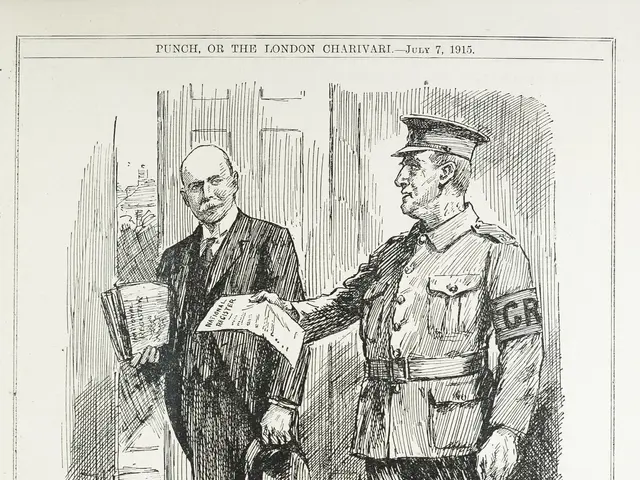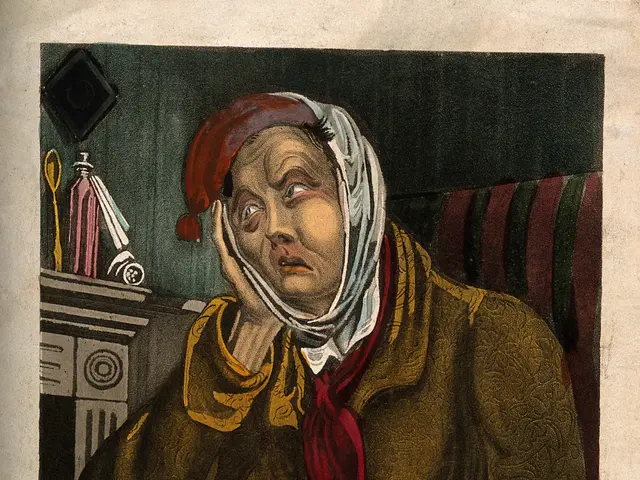Potential surge in measles cases across the U.S. within the next quarter-century due to decreasing vaccination rates.
In the near future, the United States could wrestle with staggering numbers of measles cases—up to a whopping 51.2 million over the next 25 years—if vaccination rates fall, a concerning study published in JAMA reveals. With anti-vaxxers occupying the upper echelons of government and the populace remaining distressingly uninformed about the perils of measles, it's a ticking time bomb.
Measles, rubella, poliomyelitis, and diphtheria—diseases we eradicated in 2000—are once more posing a threat due to reduced vaccination rates, according to researchers at Stanford University. Should childhood vaccinations plummet by 50%, the next quarter-century would see a wave of misery, with a whopping 51.2 million measles cases, 9.9 million rubella cases, 4.3 million poliomyelitis cases, and 197 diphtheria cases. This tumultuous period would result in 10.3 million hospitalizations and a staggering 159,200 deaths, the simulation model predicts.
An even slightly less dire scenario—a 10% decline in MMR vaccinations—would still lead to 11.1 million measles infections in the U.S. Since the population needs a vaccination rate of approximately 95% to achieve herd immunity for measles, the slightest dip can have catastrophic consequences.
On the flip side, if vaccinations rose by just 5%, the U.S. would see only 5,800 measles cases. Researchers estimate current vaccination coverage varies from 87.7% to 95.6% across different states. New York boasts a respectable childhood vaccination rate of 97.7%, while Idaho struggles with only 79.6%.
Before the measles vaccine was introduced in 1963, millions of Americans contracted the measles each year, with tens of thousands hospitalized and 400-500 deaths annually. Moreover, measles triggers immune amnesia, hindering the body's ability to combat other infections.
Currently, the U.S. is grappling with its worst measles outbreak in a quarter-century, with at least 800 cases reported across 25 states. Three fatalities have been recorded, including two children in Texas and an adult in New Mexico. The anti-vax movement's intransigence is alarming, with families of victims defending their choice not to vaccinate. Robert F. Kennedy Jr., who chairs the Department of Health and Human Services, is a vocal anti-vax proponent.
Kennedy and his allies claim that vaccines cause autism and are convinced they've found the cause. They're leading the "Make America Healthy Again" movement and amassing a team of scientists to uncover the supposed secret behind the autism "epidemic." Kennedy has allegedly been gathering private health records of Americans, raising serious concerns about privacy violations.
These developments paint a dismal picture for public health in the U.S., with top health officials rejecting science and focusing on issues like teen testosterone levels and the possible link between vaccines and chronic diseases that supposedly didn't exist during Kennedy's childhood. This shift is deeply worrying, particularly when considering that the current administration continues to challenge the scientific consensus and question the legitimacy of vaccines.
References:[1] CIDRAP, JAMA, Healthline (2025)[2] Stanford University researchers[3] CDC data on vaccination rates[4] CDC data on historical measles cases[5] CDC data on measles complications
- The staggering rise in measles cases over the next 25 years could be a reflection of science misconceptions and the increasing anti-vaxxer sentiment in politics.
- The disastrous future of health and wellness in the U.S. is evident in the upcoming surge of preventable diseases like measles, due to low vaccination rates and flawed policy and legislation.
- With the future of science-based medical-conditions policies hanging in the balance, mental-health issues like the anti-vaccination movement are becoming a significant general-news concern.
- As the debate over vaccines heats up, science-denialism in government and society is pushing us towards a future marked by the horrifying awfulness of war-and-conflicts and the suffering caused by preventable diseases.
- The future of population migration in the U.S. could be drastically impacted by the ongoing disagreement over vaccines, as people may choose to relocate to regions with stronger health-and-wellness policies.
- In the face of the resurgence of diseases like measles, it's crucial to prioritize evidence-based science, support strong vaccination policies, and tackle the root causes of prevalent misinformation on health issues.
- As the current administration continues to approve appointments of anti-vaxxers in key health-related positions, it's worth questioning whether war-and-conflicts and crime-and-justice will gain more attention than the urgent need to address the health crisis at hand.
- The future of American medical care could be reminiscent of the horrors of the past, with an increase in diseases like measles causing widespread hospitalizations and unnecessary deaths.
- As the rate of vaccination declines, the U.S. could struggle with a rise in mental-health issues such as anxiety and depression related to the fear of disease outbreaks and the uncertainty of the future.
- In the short term, focusing on immunization rates and creating effective vaccine policies is critical to avoiding the catastrophic future predicted by researchers, consisting of millions of cases, hospitalizations, and deaths from preventable diseases.







